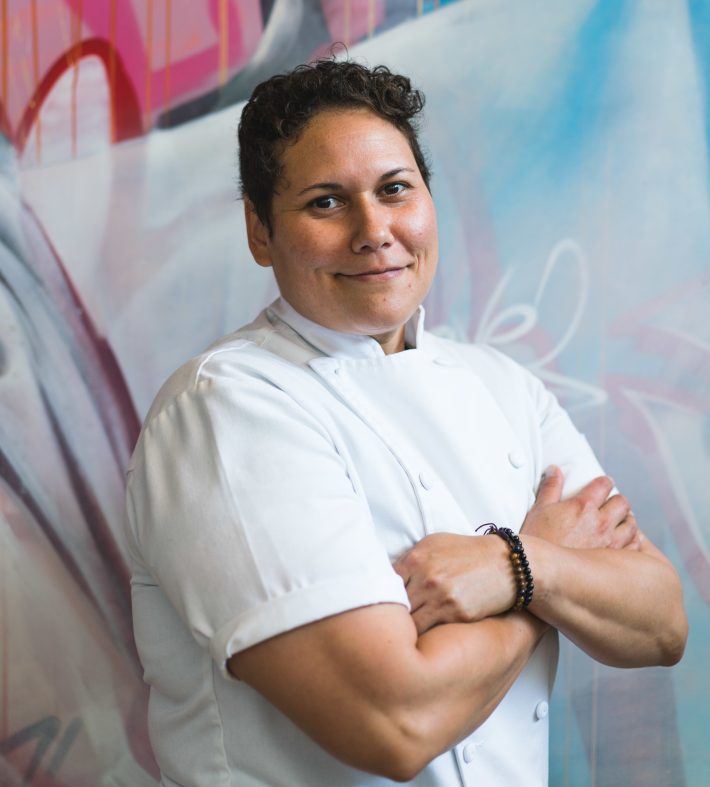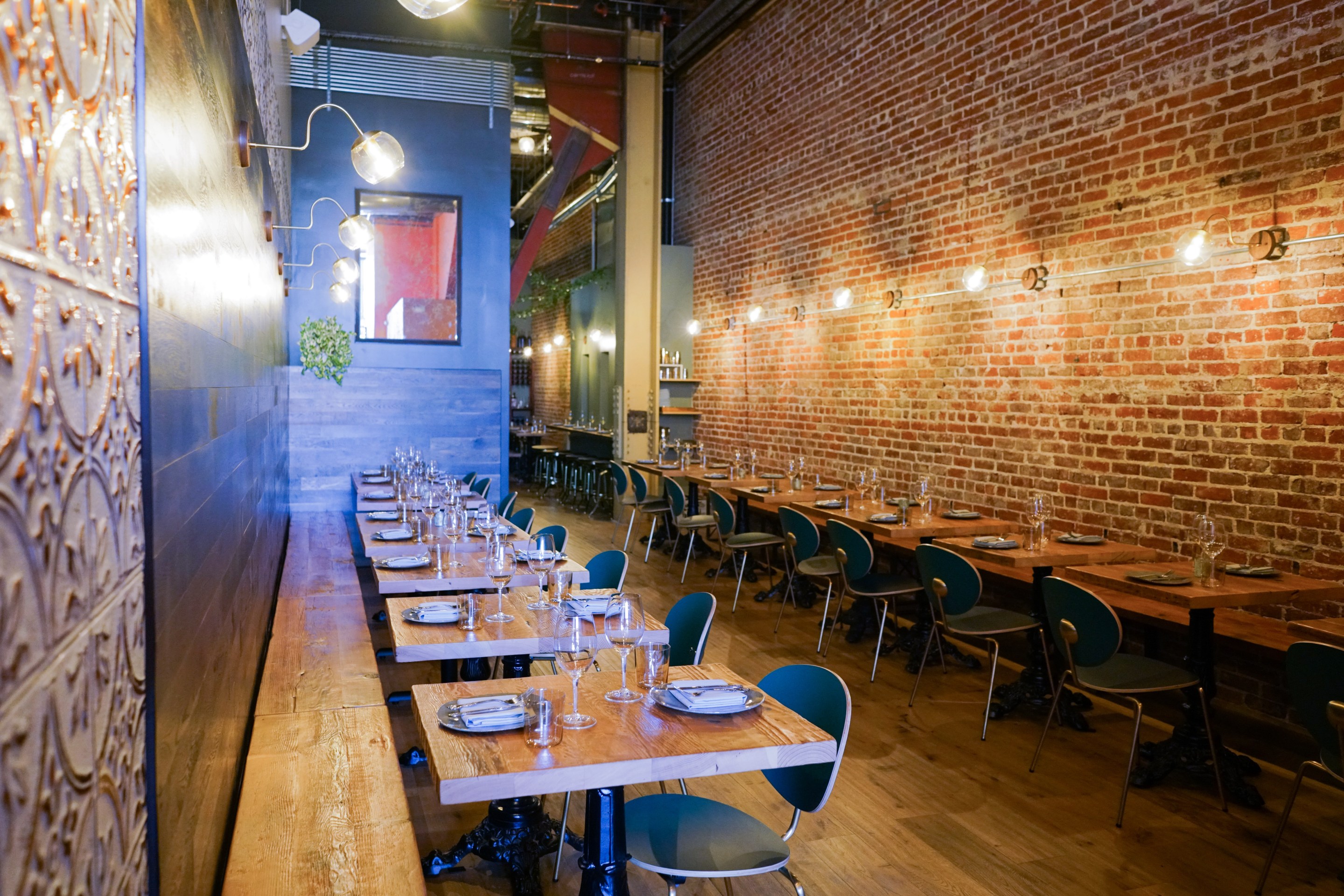[dropcap size=big]A[/dropcap] couple of years ago, Teresa Montaño, chef and owner of the newly opened Otoño, noticed that her most reliable employee was falling asleep on the job.
An immigrant from El Salvador, the employee could effortlessly switch from the garde manger station to dishwashing to bussing, and excelled in all. She knew he worked another job, like many other back-of-house workers do, but he had seemed more tired than normal. Until one day, he finally admitted to her: “I’m working literally all day and all night as hard as I can and I can’t still make enough money to bring my son.”
Montaño knew exactly what he was talking about.
Her employee was working to exhaustion so he could pay a coyote to bring his son across the border. The son had already made the journey from El Salvador to Mexico, where he had been waiting for the final leg of his journey. But Montaño’s employee was still short several thousand dollars to make it happen.
As of last year, human smuggling services have been estimated to be in the $15,000 range. On a modest back-of-house salary – typically between $22,000 to $32,000 – having that amount of money in your pocket, in a city where the average rent for a one-bedroom apartment is hovering at $2,000, seems almost impossible.
Montaño brought the money in cash the next day.

The Struggle
[dropcap size=big]M[/dropcap]ontaño knows this struggle very well. Otoño is the second restaurant she’s opened. If there is one thing she’s learned, it's that a good restaurant simply cannot function without a good team. “After my first restaurant, I’ve found that I’m as passionate at building good teams as cooking food.” For her, this not only means hiring good people but also fostering an environment where everyone trusts one another, has clear communication, and functions as a safe space for all.
This philosophy has worked for her as she brought eight employees from her former restaurant in Pasadena to work at Otoño, where she currently employs 22 people.
It’s easy to say all of this on paper and it sounds like common sense. But as Montaño would find out, being down for your employees like that, sometimes means being faced with the moral issue of lending $5,000 to your most reliable employee to bring his son from El Salvador “the hard way,” as she puts it.
While there is no data available on how common it is for chefs to financially assist their employees to help bring their loved ones to the US, the restaurant industry is one of the largest employers of immigrants. The last documented estimate of immigrants in the food service industry was in 2009 with 1.4 million, out of the estimated 12 million documented immigrants in this country.
As it turns out, it’s a lot easier to obtain fake documentation to be able to work in the U.S. than one would expect. Just take a walk near MacArthur Park and follow one of those guys who yell, “Micas!” That’s a code word on the streets for any kind of fake documentation you need to survive in the country.
“We don't know how prevalent the practice of restaurant owners facilitating procurement of falsified IDs for people without documented status is,” a representative from Restaurant Opportunity Centers United told to L.A. Taco over email. We know that the restaurant industry is a large employer of immigrants and clearly, of immigrants who lack a legal status."
If you or a loved one have ever worked in the hospitality industry, you know that the demand for employees for that kind of work is insatiable. A quick browse through Craigslist in any major city will validate this fact. However, there is also a shortage of back-of-house talent – cooks, dishwashers, bussers, runners – happening in major cities all around the United States. If the pattern of restaurant growth around the country continues as the way the Bureau of Labor Statistics predicts, there will be a demand for more than 200,000 new line cooks by 2025.
Seeing these numbers in the restaurant industry and noticing that this trend of lack of personnel for trade jobs is appearing throughout other industries despite today’s anti-immigrant political climate, it’s no wonder that restaurant owners are willing to do whatever they can to keep their good employees as long as they can. This is especially true in the physically taxing work that is the restaurant business, where sometimes a 50-cent wage difference is enough to make a line cook jump to another kitchen.

The Outcome
[dropcap size=big]C[/dropcap]hef Montaño hopes that sharing her personal story about immigrants in the restaurant environment will help bring awareness to the subject, and teach people to appreciate the immigrant workforce.
When asked why she chose to share her story, she points to the issue being part of greater conversation. “People don’t really understand how much this industry relies on the immigrant workforce. We need to recognize this and embrace it.”
She does not fear retaliation, but she is keeping her employee’s identity anonymous for obvious reasons. “I knew I was his last resort and I was really glad that at that point, I was able to do that," Montaño said. "He is family to me. I don’t put a price tag on that.”
Her employee paid her back in approximately three months. A couple of months later, his teenage son walked through her restaurant door. “In this industry, I’ve learned that you can’t buy loyalty, you just have to treat people right.”
Montaño is not the first chef and restaurant owner who has gone on record with helping to pay an employee to illegally bring a family member from Mexico or Central America. Nick Zukin of Mi Mero Mole in Portland, Oregon wrote about a similar experience. In his article on Willamette Week, Zukin admits that part of the reason he decided to help was his “frustration seeing migrant and refugee families detained and separated from their children under the current administration's ‘zero-tolerance’ policy.”
L.A. Taco reached out to him to see if he faced any legal repercussions since going public with his story and he responded, “Nope.”
CHIRLA, The Coalition for Humane Immigrant Rights of Los Angeles that often serves as a pro bono watchdog for many restaurant employees in the city, also had no deeper information on the practice of restaurant owners helping their employees financially in this sort of situation. Although, over an email inquiry, they noted that “crossing the border without documentation has become an increasingly dangerous experience.”
Montaño herself identifies as Hispanic and grew up in Albuquerque, New Mexico. She shares that her family was New Mexican since before New Mexico was even a state, and that she is proud of her Native American and Spanish roots.
She goes on to say that the subject of politics is not welcome in the kitchen as a topic of discussion. “Sometimes, you have to turn your head away from all the political bullshit and recognize that this is a person who works their ass off and needs to be compensated and taken care of — just like anyone else, especially in Los Angeles. It’s ‘occupied Mexico’.”
That same cook still works the line with Montaño, and still comes through to pick up any last minute urgent shifts that are needed.
“He started as a dishwasher and now he’s one of my best cooks, who plates the prettiest.”
ALSO BY THE AUTHOR:
A Cold Email From a Food-Obsessed Teen: Why I Owe Everything to Jonathan Gold
‘This Side of Hoover’ Is Archiving Gentrification In East Hollywood, One Portrait at a Time







